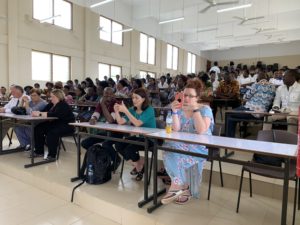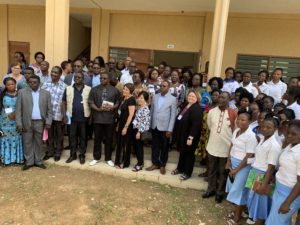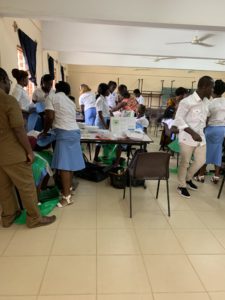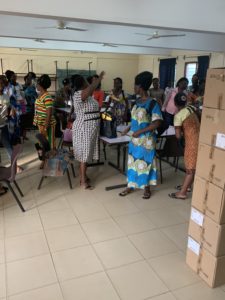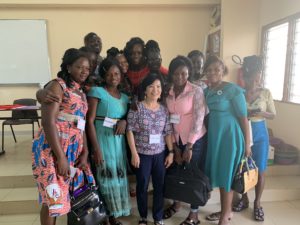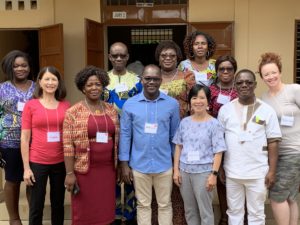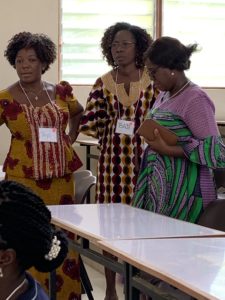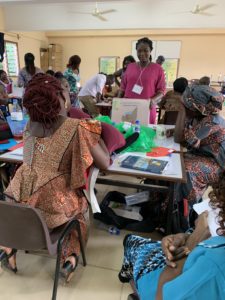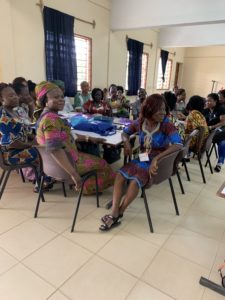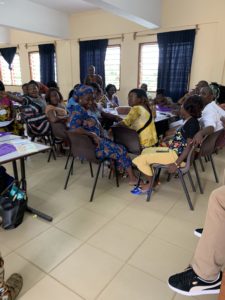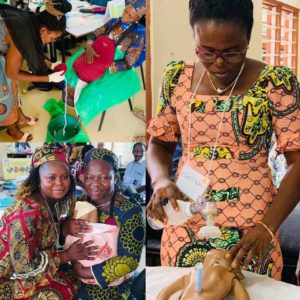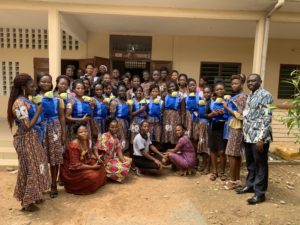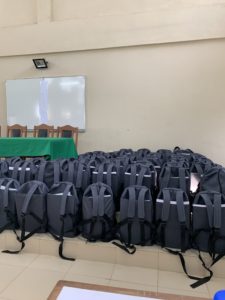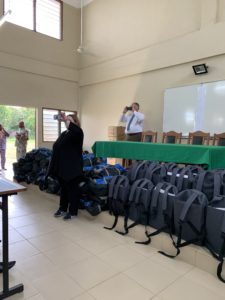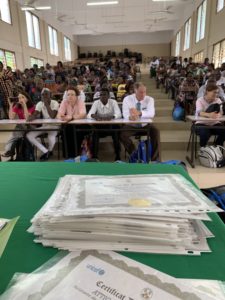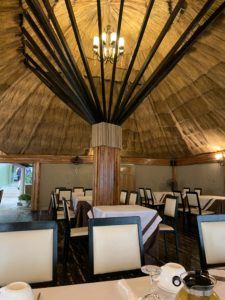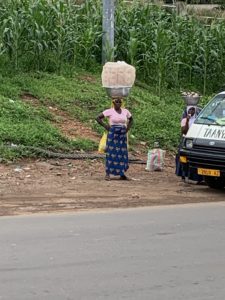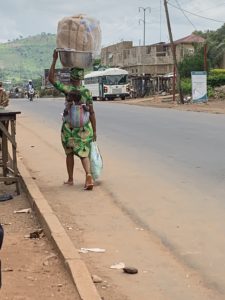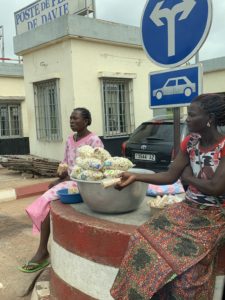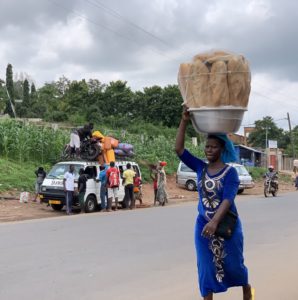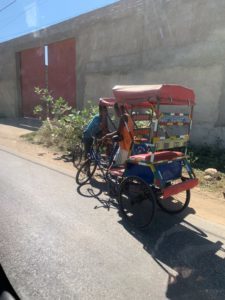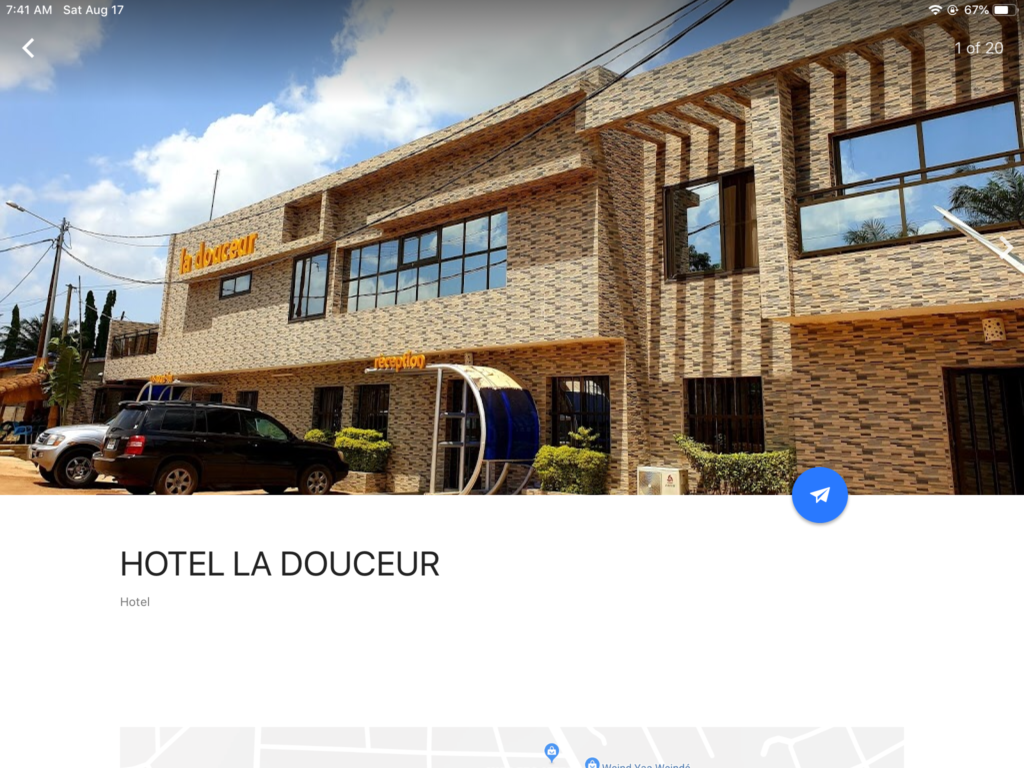
After training the master trainers in Togo, we made the trip to Kara, a town in the North of Togo, about 420 kms from Lome. We were expected to make the trip in 6 hours. The US team with seven members and five of our interpreters and in-country coordinator came up together in one van. It was cozy (to say the least) in the van; luckily the air conditioner is working. There was only one highway from the capital of Lome to the northern districts. The master trainers arranged to travel to Kara by themselves.
North of Lome, we passed through little towns like Tsevie, Notse, Kpalime, Atakpame. We traveled pass forests of teak trees, many cut and burn to make charcoal by locals who then packed it in striped bags stacked on the side of the road to be picked up by transport trucks. Bertie, our in-country coordinator, told us the trees took up to 10-15 yrs to be useful. The government is trying to replant them and we saw little plants covered by burlaps along the burned remains.
Along the way I saw typical African huts with straw roof coverings, children running and playing with each other and with their dogs. I saw children playing around old car. I saw men resting in the shades. I saw very few women as we passed the villages. However when we stopped at Atakpme for lunch and bathroom break, the women came. They carried basket of bread, bananas, cheese on their heads and with a cloth wrap, carried their babies on their backs and holding older children by the hand. The same pattern repeated at gas stations. The women and children sold eggs, breads, cheese, fruit, Kleenex tissues, gum, everything.
We passed from teak forests to mountains. We encountered more and more military transport. Near Sokode, a town not too far from Kara, the entire column of bus, vans and cars slowed down to a crawl behind a military convoy. It appeared that the president of Togo was in Kara, celebrating his birthday. The trip that was supposed to be six hours took eight hours.
When we arrived to Kara, we stopped by the National School of Midwifery where the training would take place the next six days. We checked out the facilities, arranged the transport of mannequins and teaching materials from the storage room to the classrooms. There were 2 groups of participants: around 50 recent midwife-graduates and a second group of equal number of practicing midwives, obstetricians and pediatricians. Each group will go through 3 days of training for Helping Mothers Survive (Bleeding After Birth and Pre-eclampsia and Eclampsia) and Helping Babies Breathe with Essential Care for All Babies and for Small Babies. I would be in charge of the training for HMS since I was the only French speaking obstetrician in the group. The HMS team also included 2 Labor and Delivery nurses who worked with interpreters to help the participants with the practice of scenarios and with the mannequins. The training was carried out by the local 4 midwives and 3 obstetricians in the group. In listening to these healthcare professionals leading the discussions, I learned a lot about the usual practice of obstetrics in the clinics and hospitals in Togo. I also learned a lot of French terms. We adapted the teaching to the available medications and usual practice in Togo. One funny incident was when one medication used for hemostasis in post-partum hemorrhage was explained, initially the participants did not know the name of the medication as the generic name was used. The obstetrician who lead the discussion had a great time keeping the suspense up until he gave the name for the medication used in Togo. The participants all laughed out loud as they have been using tranexamic acid to stop or prevent bleeding but under the name of Exacyl.
There was a big opening ceremony with TV reporters, UNICEF representative in Togo, Deputy of Ministry of Health of Togo, Public Health officer in Kara. And of course, there was also a closing ceremony with certificates of completion and the allocation of mannequins, ambu bags and training materials to the participants and their clinics. This was a big project for the project team leader to assure each clinic and hospital gets the appropriate number of mannequins and training materials to help perpetuate the training.
We stayed at a small hotel, hotel La Douceur, with the best restaurant in town as it was contracted to provide the food for all lunches and breaks for the entire week of training. With the numbers of our team, the hotel ran out of rooms and a few of us ended up in rooms with no running hot water. There was working air conditioning though. Each morning, I had to call the front desk to bring a bucket of hot water to the room so I can mix with cold water for shower. It took some days to get used to the system. The food was really good and the portions were very big so we devised a plan to eat with a partner so we did not end up with wasted food. It worked out really well. At check out, we found out the small hotel of La Douceur did not take credit card or US dollars, only CFA francs or Euros (Note to self: always check with the reception at check in to see if they take credit card or only local currency). It was on a Sunday and a Muslim holiday so everything was closed, even the currency exchange store. Fortunately, our interpreter recognized a man in the hotel restaurant who just happened to be on TV a lot and was both a pediatrician and a general in the Togolese army in charge of drug enforcement. After she explained our dilemma to him, he guaranteed our dollars and the clerk agreed to settle our bill with the US dollars. The general happened to plan on a trip to the US so he would bring enough CFA francs to the hotel the next day to exchange for the dollars. All ended well and we were just very thankful.
I was so glad to have come to Togo. I love getting to know the participants and was just very impressed of how everybody tried to do the best for the patients with the limited facilities and medication available. I learned women in Togo do not get pain meds or local anesthesia, only “grit your teeth and courage”. Every single participant just kept saying “Courage! Courage!” as they performed a procedure, be it an intramuscular injection or a uterine evacuation. Togolese women are very brave and courageous!

